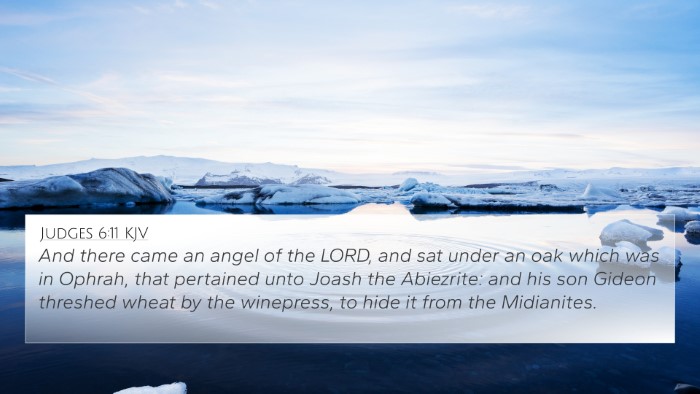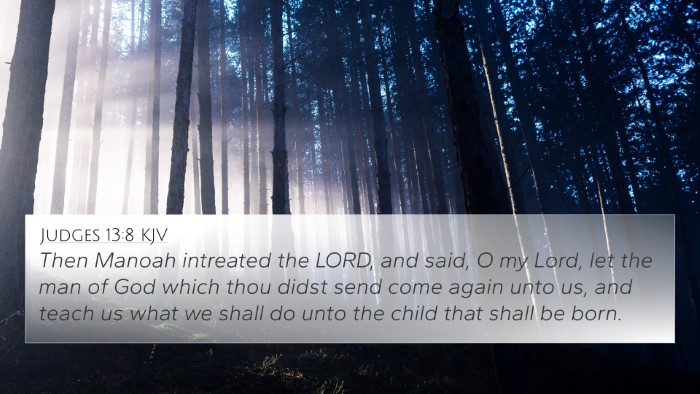Bible Verse Meaning: Judges 13:3
Verse: Judges 13:3 - "And the angel of the LORD appeared unto the woman, and said unto her, Behold now, thou art barren, and bearest not: but thou shalt conceive, and bear a son."
Overview
This verse marks a significant moment in the biblical narrative, introducing the birth announcement of Samson, a key figure in the book of Judges. The angel of the Lord brings a message of hope to a woman who is physically unable to bear children, signaling divine intervention and the fulfillment of God’s promises.
Commentary Insights
This verse has been explored in depth by commentators such as Matthew Henry, Albert Barnes, and Adam Clarke. Here’s a summary of their insights:
Matthew Henry
Matthew Henry emphasizes the miraculous nature of the announcement. He notes that the angel's visit signifies God's grace and attention towards those who feel hopeless. The mention of barrenness reflects not only the physical condition of the woman but also the spiritual barrenness that Israel was experiencing at the time. The birth of Samson is portrayed as a divine solution to the nation’s need.
Albert Barnes
Albert Barnes sheds light on the significance of angelic appearances in the Old Testament. He points out that the appearance of the angel signifies God’s direct involvement in human affairs. Barnes also highlights God’s promises, drawing parallels to other women in the Bible who conceived against odds (like Sarah and Hannah). This moment underscores God's ability to intervene in seemingly impossible situations.
Adam Clarke
Adam Clarke provides historical context to the passage, noting that the woman’s barrenness would have brought social stigma in ancient Israel. He remarks on the angel’s reassuring words, which offer both comfort and hope. Clarke suggests that this announcement is not just a prediction but a prophetic declaration that serves as a foundation for God’s plan for deliverance through Samson.
Theological Implications
The verse serves as a reminder of God’s sovereignty and His ability to bring forth life and purpose from what seems desolate. It illustrates the theme of divine purpose in ordinary lives, emphasizing that God can choose anyone to fulfill His will, regardless of their circumstances.
Cross References
In understanding Judges 13:3, readers are encouraged to explore its connections and implications through cross-referencing other biblical texts:
- Genesis 18:10-14: The announcement of Isaac's birth to Sarah, paralleling themes of barrenness and miraculous conception.
- 1 Samuel 1:20: Hannah's prayer and the birth of Samuel, highlighting God's intervention in barrenness.
- Luke 1:13: The announcement of John the Baptist’s birth, emphasizing angelic visitation and divine action.
- Matthew 1:20-21: The angel’s message to Joseph regarding the birth of Jesus, underscoring God's redemptive plan.
- Judges 16:28: Samson's eventual downfall and redemption, illustrating the fulfillment of the promise made in Judges 13.
- Galatians 4:4: The idea of God sending a son in the fullness of time, connecting to the theme of divine timing.
- Hebrews 11:32-34: Reference to the judges, including Samson, showcasing faith and divine support.
Thematic Connections
Thematically, Judges 13:3 connects to broader biblical narratives regarding:
- Hope and Restoration: The promise of a son signifies hope in what seems hopeless.
- Divine Intervention: God’s direct actions in the lives of His people.
- The Role of Women: Significant female figures in the Bible who experience transformation and agency through divine promises.
Practical Applications
For readers and scholars, examining this verse can yield several insights:
- The Power of Prayer: The necessity of bringing our burdens before God, as evidenced by the woman’s situation.
- Faith in Difficult Times: Encouragement to trust in God’s promises, much like the woman did.
- Understanding God's Plans: Recognizing that God's timing and methods might differ from our expectations, but remain sovereign and good.
Conclusion
Judges 13:3 serves as a pivotal verse that not only introduces a significant biblical character but also provides rich material for cross-referencing and thematic exploration within Scripture. By linking Bible verses and understanding their connections, believers can gain deeper insights into God's character and His plans for humanity.















